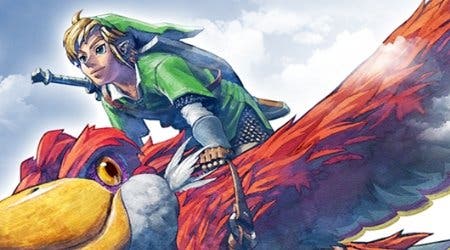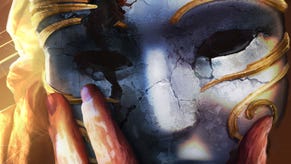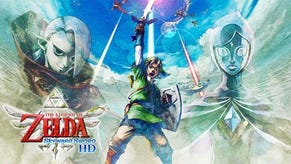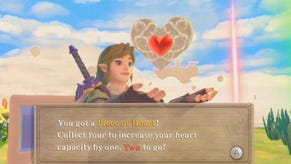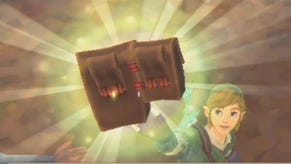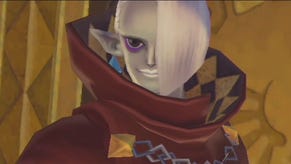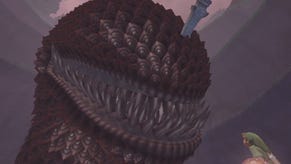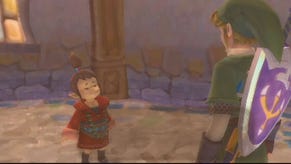Game of the Week: Zelda: Skyward Sword
Young love.
Some retail maven somewhere must have calculated that you need a minimum of five weeks on store shelves before Christmas to make the most of the seasonal spending boom. Whatever the reason for the sudden deadline, this week's release schedule - following last week's clash of the titans - is an unseemly stampede of games of every stripe: big sequels, slick kids' games, remastered classics, motion control novelties, branded tie-ins, hardcore updates, indie hopefuls, not to mention new entries in two of the most storied video game series ever.
It ought to have been the most hotly contested game of the week since we started running this column last year, but in actual fact the choice was an easy one. That wasn't for lack of quality elsewhere, though.
Starting at the humblest end of the spectrum, I can't resist a second chance to namedrop a delightful PSN Mini which went on general release this week for £3.99 after a few weeks as a free bonus for Plus subscribers."Where Is My Heart? is a video game about video games - about the possibilities that still lurk within even the busiest of genres, and of great new ideas brought to life by ingenuity, focus, and flair," wrote Christian in his Where Is My Heart? review. Here's hoping it gets noticed at all.
Naturally, no such challenge faces indie emperor Notch, who takes the phenomenal Minecraft out of beta today, with great ceremony, in an official release timed to coincide with the first Minecon convention in Las Vegas. Nothing about this, one of the biggest success stories in games this century, has been normal, and that includes the fact that there was no obvious moment to review a game that did all its growing up in public. Still, we couldn't resist the temptation.
"Minecraft is a towering achievement in the very possibilities of gaming, and it does this without losing itself to either esoterica or cynicism. It is a game anyone can play and anyone can get something out of, no matter how skilled or imaginative they are. They will make something and they will have an experience that feels like theirs and theirs alone," wrote Alec in our ridiculously belated, and also perfectly on time, Minecraft review.
"The last two of years of public-eye development also make for a vital and joyous lesson for modern gaming itself: go your own way, listen to your players, celebrate what human beings can do rather than what you can make them do." Needless to say, it would have been game of the week if it wasn't actually the game of last year.
You'll forgive me if space and time force me to gloss over the bulk of the week's gamer-baiting sequels. In all honesty, none of them seems that exciting anyway in a post-Skyrim world, even if none of them is actually a bad game (although the latest Need for Speed comes close). The big open-world actioners Assassin's Creed and Saints Row do what they do, but the genre's going to need a shot in the arm soon to stop it turning into a mere volume business in video game content. Meanwhile, a bizarre remake of the first Halo couldn't disguise the brilliance of Bungie's original game any more than it could the fact that Microsoft has no real understanding of the alchemical combination of raw talent and blind luck that made it that way. Even if it did, it would have no way to replicate it. Our hopes for Halo 4 are at an all-time low.
The happy story of the week, though, is that with the advent of Christmas, the games industry has finally turned its attention to its first, most loyal and, these days, most sadly neglected supporters: children. Two British studios with a fine understanding of this surprisingly demanding market offered some of their best work this week: Traveller's Tales with the second Lego Harry Potter, arguably the most refined expression to date of that infallible formula; and David Braben's Frontier with a Kinect-powered hymn to Disneyland that had former Pirate of the Caribbean Donlan in a spin. Simple games, sure, but they don't condescend in quality or sell their young audiences short.
Of course, there is no greater practitioner of this art than Nintendo. I don't think the Kyoto company consciously makes games for children any more than it consciously doesn't, but the idea of a game that can't be appreciated by a young mind is simply not one that seems to occur to its core design teams. And any adult lucky enough to have played its two magnificent releases this week will already know the childish wonder, curiosity and glee they can inspire in the most jaded gamer. To play them is to be a bit of a child again - and to wish you really were a child, because how amazing would they be to you then?
Perhaps it's because the designers themselves are so young at heart, suggested Christian (again) in his review of Super Mario 3D Land. "Despite the in-jokes and the endless self-referencing, despite the cameo appearances and the antic reinvention of old ideas, in some central way, each Mario game feels like the first.
"Each presents itself like the work of a brilliant young team getting every idea it can think of onto the screen, and refusing to rely on any kind of cheap crutch. Can you imagine a QTE boss fight slapped on top of a core Mario game? Can you imagine an XP system stuck through the middle to make it last a little longer?
"You could wish for 3D Land to be a little more challenging in places, then, but you couldn't wish for it to be any denser, any more imaginative, or any more daring. Most importantly, you couldn't wish for it to be any more playful."
And play is what we all came here to do, right?
The Legend of Zelda: Skyward Sword
It's been a rough year for Nintendo, with 3DS' slow launch, the fumbled announcement of Wii U and Wii's not-so-graceful decline drawing shareholders' attention to the fact that the company had strayed too far from what it does best, and from a once-loyal fanbase that is on the point of dwindling to nothing.
Fortunately, it's a realisation Satoru Iwata and Shigeru Miyamoto must have come to much earlier, when they set in motion the development of Super Mario 3D Land's compact distillation of Mario's genius and the simply staggering swansong for the Wii that is The Legend of Zelda: Skyward Sword.
It's a game that ought to be tinged with regret (or resentment) for what might have been, if Nintendo had been more focused on marrying its obsession with mass-market motion control to its mastery of the traditional video game form. But Skyward Sword doesn't entertain such feelings for a second, and nor will you.
Unlike its predecessor Twilight Princess, it's not an apology or a distracted attempt at fan-service. Nor is it the studious, self-regarding tribute of a New Super Mario Bros. It's from the heart, and it showcases the designers and artists of Nintendo's EAD studio at the height of their considerable powers. These guys are so good it will make you weep; tossing away the kind of mechanic they used to hang whole games on as a side-show, rewriting your most basic interaction with video games as an encore, but letting one marvellous adventure take centre stage.
"Skyward Sword feels like the Legend of Zelda game producer Eiji Aonuma always wanted to make... It is the most formally inventive Zelda in a long time (admittedly, that's not saying a great deal). But it's the game's carefree attitude, quick tempo and warm heart that do the most to make it feel new," I wrote in our Zelda: Skyward Sword review.
"Maybe you've played enough Zelda games by now that even that won't be enough to cleanse your palate. That would be a fair response, but if it's so, this game wasn't made for you. Like a tale told from one generation to the next, the point is to keep the tradition alive for others - and for them, Skyward Sword will surely be the greatest adventure money can buy."
And if you're still playing Skyrim, don't worry. Take your time. The Elder Scrolls may be for life, but Zelda's for Christmas. Save Skyward Sword for the holiday, and you'll really feel like a kid again.
